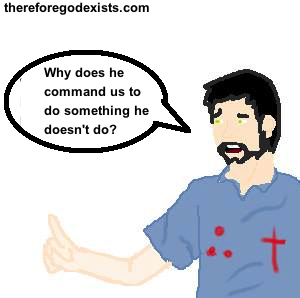 It seems to be almost a form of pride that people take in their theological stances, in that they begin to say that they alone have the truth, and everybody else is wrong. They alone have the correct interpretation, and everybody else is wrong. But this extends even further when people begin to say that because they alone have the correct interpretation, that therefore, God loves them alone, and does not love everybody else. This sort of pride is represented best by the certain cult groups, who I do not wish to promote by naming them. In affect, many groups teach that God does not love the world, but only his elect, or only those who love him. Of course, this stands in contrast with the typical view that God does love everybody. So, does God love everybody?
It seems to be almost a form of pride that people take in their theological stances, in that they begin to say that they alone have the truth, and everybody else is wrong. They alone have the correct interpretation, and everybody else is wrong. But this extends even further when people begin to say that because they alone have the correct interpretation, that therefore, God loves them alone, and does not love everybody else. This sort of pride is represented best by the certain cult groups, who I do not wish to promote by naming them. In affect, many groups teach that God does not love the world, but only his elect, or only those who love him. Of course, this stands in contrast with the typical view that God does love everybody. So, does God love everybody?
Now, the view that God does not love everybody, is not a view only represented by cult groups. There are many eminent theologians and men who are guided by God who have reached this conclusion.  It is my impression that Paul Washer holds the view that God does not love everybody, as is the case with many who adhere to Reformed Theology. This view that God loves everybody is represented by some very intelligent and humble theologians who love God. The problem, though, is that it is just not true. God does love all of mankind, and I do not say this because I prefer it, but rather, I say it because it just what the Bible plainly teaches.
It is my impression that Paul Washer holds the view that God does not love everybody, as is the case with many who adhere to Reformed Theology. This view that God loves everybody is represented by some very intelligent and humble theologians who love God. The problem, though, is that it is just not true. God does love all of mankind, and I do not say this because I prefer it, but rather, I say it because it just what the Bible plainly teaches.
There are certainly emotional reasons on both sides to support a conclusion. The idea that God loves everybody is much more emotionally tolerable than the view that God does not love everybody. But ours is not a doctrine based on emotion, nor what we prefer. Our doctrine is based solely on what the word of God says, because the word of God is his revelation to the world, and is the sole authority for divine truth. The Bible is where God has revealed the answers to these questions. Does God love everybody? Well, what does the word of God say?
Be Perfect.
When it is said that we should be perfect, it means that we should strive to reach the perfect standard that God has set for us. As the most perfect being, God must be all-loving, because it is obviously better to loving than unloving. This is precisely what Jesus taught. He said in Matthew 5:43-48, ““You have heard that it was said, ‘Love your neighbor and hate your enemy.’ But I tell you, love your enemies and pray for those who persecute you, that you may be children of your Father in heaven. He causes his sun to rise on the evil and the good, and sends rain on the righteous and the unrighteous. If you love those who love you, what reward will you get? Are not even the tax collectors doing that? And if you greet only your own people, what are you doing more than others? Do not even pagans do that? Be perfect, therefore, as your heavenly Father is perfect.”
Now here, Jesus is commanding us to be perfect, in the sense that we have love, even for those who do not love us. He is commanding us to be perfect, in the sense that we love those who are our enemies. He goes on to say that we should be perfect in this way, just as our Father in Heaven is perfect. In affect, Jesus taught that our Father in Heaven is perfect, in the sense that he loves those who do not love him. He loves his enemies. Who is he referring to? Jesus says, the Pagans, the tax collectors, the unrighteous. These are the people who the Father in Heaven loves so much.
Further, if it were the case that God did not love these people, then God would be commanding people to do things that he, himself, does not do. He tells us to love our enemies, despite that he does not love his enemies. He is telling us to take a moral action, that he does not take. In this way, if it were said that God did not love everybody, then it could also be said that there are many men in the world who are greater than God in this way. So, does God love everybody? Jesus is teaching that emphatically, yes, he does, and even sets the standard for love for ones’ enemies that we need to strive to meet.
Who Does God Hate?
Of course, this raises the question of who God hates. Why does the Bible sometimes say that God hates people? Romans 9:13 says, “Jacob I have loved, but Esau, I have hated.” Now, I think one could deal with these passages on a case-by-case basis. I do not think that God is expressing an eternal hatred for Esau, but rather just a statement about the unrighteousness of Esau, that he refused to follow God. Most Christians will say that God was saying that he hated Esau’s sin, but loved him. He hates the sin, and loves the sinner. This is essentially what I think God was expressing here.
However, even if we grant that God did hate Esau, that does not mean that God does not love him. The statement, “I hate Esau,” does not contradict the statement, “I love Esau.” The negation of love, is not hate. The negation of love is un-love. But God never says, “I do not love Esau.” He says, “I hate Esau.” But often, we hear of people having love-hate relationships. Perhaps you (reader) are in one, or have been in one in your life. Perhaps you have had a boyfriend, girlfriend, or spouse, who you felt as though you both loved, and hated. Love and hate are not mutually exclusive. Therefore, while God may hate Esau, that is not to say that he does not love Esau.
So, when it is said that God hates somebody in the Bible, it is essentially being expressed that he hates their sin, but still loves the sinner. However, even if it were saying that the hated the sinner, he could still love the sinner. Hate and love are not mutually exclusive. Does God love everybody? There are good biblical reasons to think that he does, and there are no biblical reasons to think that he does not.
If you would like to get in on the discussion about this, join my Theology Discussion Group!